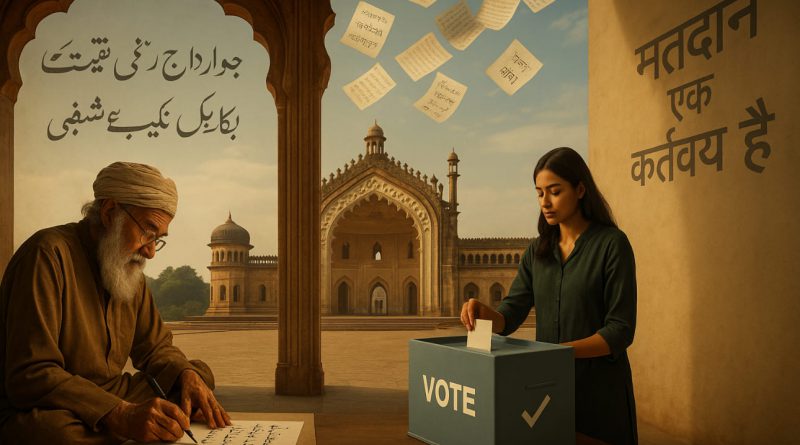Why We Must Speak Urdu and Vote in Hindi: Embracing India’s Beautiful Complexity
When an Indian citizen greets the morning with a sher in Urdu and casts their vote with clarity in Hindi, that is not division—that is unity.
In the grand mosaic that is India, language is more than a tool of communication—it is a carrier of memory, identity, and belonging. Among the many tongues spoken across this vibrant land, two stand out for their profound cultural weight and political relevance: Urdu and Hindi.
They are more than “sister languages.” They are intertwined voices of the Indian soul—one capturing the lyrical nuance of our poetry, the other anchoring the voice of the common citizen in the political sphere. Speaking Urdu and voting in Hindi is not just poetic symbolism—it is a civic and cultural necessity.
Urdu Was Born in India, Not Pakistan
Despite popular misperception, Urdu was not born in Pakistan. It was born in the heartlands of India—in Delhi, Lucknow, and Hyderabad. These cities were not only cradles of Islamic scholarship and art but also the nurseries of this graceful language. Pakistan adopted Urdu as its national language despite having a population dominated by Punjabis, Sindhis, Balochs, and Pashtuns. In doing so, it imposed Urdu rather than let it evolve organically.
India, on the other hand, allowed Urdu to breathe. As Pakistan’s Mufti Tariq Masood once said in his lecture, “Urdu ki paidaish Lucknow hai” (Urdu’s birthplace is Lucknow).
The late Jagjit Singh, whose ghazals still echo in millions of Indian homes, once remarked, “Urdu is not just a language; it is the legacy of our shared culture.” This language doesn’t belong to a religion or a country—it belongs to civilization.
The legacy of Urdu extends beyond poetry and politics—it has been instrumental in preserving and transmitting Islamic scholarship on Indian soil. A powerful testament to this is the visit of Late. Shaykh Rabee bin Hadi Al-Madkhali, one of Saudi Arabia’s most prominent Islamic scholars, who spent time in Hyderabad—a city renowned for its Deccani Islamic heritage. During his stay, Shaykh Rabee engaged in deep study of classical Islamic texts, and notably, collaborated with an Urdu-speaking translator to access key Indian commentaries and manuscripts.
Hindi: The Democratic Lifeline of India
If Urdu is our soul’s poetry, Hindi is the pulse of our democracy. It is one of the most widely spoken languages in the world, and in India, it plays a vital role in shaping political consciousness. Hindi is the language of campaign slogans, election manifestos, and parliamentary debates. It is the medium through which the majority of Indians understand their rights and duties.
In electoral politics, voting in Hindi is empowerment. It ensures that ordinary citizens—farmers in Bihar, homemakers in Uttar Pradesh, factory workers in Madhya Pradesh—can engage meaningfully with democracy. When political content is available in Hindi, it levels the playing field, ensuring no one is excluded because of linguistic elitism.
Two Languages, One Nation
Speaking Urdu while voting in Hindi may seem paradoxical, but in reality, it is a celebration of India’s pluralism. Language does not divide us; it unites us when we respect each other’s mother tongues.
Rishi Suri, son of veteran journalist Navin Suri and editor of the Daily Milap—India’s oldest Urdu newspaper—continues to preserve this linguistic heritage. Bollywood too, from Majrooh Sultanpuri to Javed Akhtar, has kept Urdu alive through its lyrics, scripts, and songs. These languages are not rivals—they are reflections of each other, shaped by shared histories and cultural crossings.
Inclusivity Begins with Language
A society that values all its languages is one that values all its people. Promoting both Urdu and Hindi creates space for inclusivity, empathy, and participation. Educational institutions that teach both languages empower students to respect their country’s complexity rather than fear it.
Political leaders, too, must rise to the moment. In a time when polarizing rhetoric threatens to fragment the social fabric, championing linguistic diversity can be a powerful act of national healing. When a voter sees their language reflected in policy, media, and leadership, it strengthens trust in democratic institutions.
Media and Technology: Allies of Linguistic Justice
In today’s digital age, language is content, and content is power. Political messages in Urdu and Hindi, when disseminated through social media, WhatsApp groups, YouTube, and digital news platforms, can mobilize communities with precision and cultural resonance.
Platforms like X (formerly Twitter) and YouTube have become battlegrounds of narrative warfare. And yet, most political parties still overlook the potential of content creation in minority languages like Urdu. When done right, this can engage underserved communities, promote political education, and counter disinformation.
Digital media can also bridge generations. A young YouTuber explaining the budget in Hindi, or a poet reciting Ghalib in Urdu on Instagram, becomes part of a larger democratic dialogue—one that is multilingual and multidimensional.
Political Representation Begins with Respect
Minority languages like Urdu are often the first casualties in nationalist politics. But true nationalism celebrates every color in the national palette. Political parties must recognize that embracing Urdu does not alienate the majority—it builds bridges with a significant section of the citizenry who often feel sidelined.
Parties that use both Hindi and Urdu in outreach campaigns often find wider resonance and deeper loyalty. Voters feel seen. And when voters feel seen, they show up—not just at rallies, but at ballot boxes.
Let us not treat language as a battlefield. Let us treat it as common ground.
When an Indian citizen greets the morning with a sher in Urdu and casts their vote with clarity in Hindi, that is not division—that is unity. That is what it means to be Indian.
As we move forward into an increasingly digital and political world, the call to action is clear: Speak Urdu with pride. Vote in Hindi with power. Respect both. Fear neither.
In doing so, we preserve the best of who we are—and build a nation that honors all its voices.
Disclaimer: Views expressed by writers in this section are their own and do not reflect Milli Chronicle’s point-of-view.



